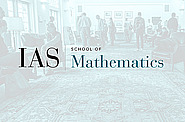Seminars Sorted by Series
Geometry, Combinatorics and Algebraic Groups
Oct
07
2004
Geometry, Combinatorics and Algebraic Groups
Holomorphic disks and Heegaard diagrams
Zoltán Szabó
4:00pm|Wolfensohn Hall
Oct
08
2004
Geometry, Combinatorics and Algebraic Groups
Topological combinatorics
Anders Björner
9:30am|Wolfensohn Hall
Oct
08
2004
Geometry, Combinatorics and Algebraic Groups
Cohomology rings of reduced spaces of spaces with group valued moment maps
11:00am|Wolfensohn Hall
Oct
08
2004
Geometry, Combinatorics and Algebraic Groups
From GrassM to GrassP: Oriented matroids in topology
2:00pm|Wolfensohn Hall
Oct
08
2004
Geometry, Combinatorics and Algebraic Groups
Character sheaves on disconnected groups
4:00pm|Wolfensohn Hall
Oct
09
2004
Geometry, Combinatorics and Algebraic Groups
Toric varieties and the local trace formula
9:00am|Wolfensohn Hall
Oct
09
2004
Geometry, Combinatorics and Algebraic Groups
Equivariant localization and intersection cohomology
10:15am|Wolfensohn Hall
Oct
09
2004
Geometry, Combinatorics and Algebraic Groups
Arrangements and ball quotients
Eduard Looijenga
11:30am|Wolfensohn Hall
Oct
09
2004
Geometry, Combinatorics and Algebraic Groups
Geometry and representations of Lie groups
Kari Vilonen
2:00pm|Wolfensohn Hall
Geometry/Dynamical Systems Seminar
Jan
26
2010
Feb
02
2010
Geometry/Dynamical Systems Seminar
Ideal Valued Measures and Topology of Maps
Misha Gromov
4:00pm|S-101
Feb
23
2010
Geometry/Dynamical Systems Seminar
Lipschitz Maps From Spaces With Many Rectifiable Curves
4:00pm|S-101
Mar
03
2010
Geometry/Dynamical Systems Seminar
Floer Homology and Loop Space Topology II
4:00pm|West Bldg. Lecture Hall
Mar
16
2010
Geometry/Dynamical Systems Seminar
Symplectically Non-Fillable Contact Manifolds and the Weinstein Conjecture
Chris Wendl
4:00pm|West Bldg. Lecture Hall
Mar
30
2010
Geometry/Dynamical Systems Seminar
Ideal Valued Measures and Topology of Maps
M. Gromov
4:00pm|S-101
Apr
13
2010
Geometry/Dynamical Systems Seminar
The Picard Lefschetz Theory of Complexified Morse Functions
Joseph Johns
4:00pm|S-101
Apr
20
2010
Apr
20
2010
Geometry/Dynamical Systems Seminar
On the Multiplicity of Periodic Orbits for Tonelli Systems
Marco Mazzucchelli
4:30pm|S-101
Apr
22
2010
Geometry/Dynamical Systems Seminar
Refining and Generalizing Gromov's Compactness Theorem for J-Curves
4:00pm|S-101
Oct
22
2010
Geometry/Dynamical Systems Seminar
Global Stringy Orbifold Cohomology, K-Theory and de Rham theory with Possible Applications to Landau-Ginzburg Theory
Ralph Kaufmann
4:00pm|S-101
Nov
19
2010
Dec
03
2010
Geometry/Dynamical Systems Seminar
A Reidemeister-Singer Conjecture for Surface Diagrams
Jonathan Williams
4:00pm|S-101
Dec
10
2010
Geometry/Dynamical Systems Seminar
Understanding Area Preserving Disk Maps Through Holomorphic Curves
4:00pm|S-101
Jan
19
2011
Geometry/Dynamical Systems Seminar
Weak Stability Boundary and Capture in the Three-Body Problem
Edward Belbruno
4:00pm|S-101
Jan
21
2011
Geometry/Dynamical Systems Seminar
The Cartan Geometry of the Rotating Kepler Problem
Otto van Koert
4:00pm|S-101
Jan
26
2011
Jan
26
2011
Glimpses of Mathematics, Now and Then: A Celebration of Karen Uhlenbeck's 80th birthday
Sep
16
2022
Glimpses of Mathematics, Now and Then: A Celebration of Karen Uhlenbeck's 80th birthday
Minimal surface stability in higher codimension
2:30pm|Simonyi 101 and Remote Access
Sep
16
2022
Glimpses of Mathematics, Now and Then: A Celebration of Karen Uhlenbeck's 80th birthday
Resonant Dynamics in Evolutionary Dispersive Equations
3:45pm|Simonyi 101 and Remote Access
Sep
16
2022
Sep
17
2022
Glimpses of Mathematics, Now and Then: A Celebration of Karen Uhlenbeck's 80th birthday
Quasi local quantities and angular momentum in general relativity
9:00am
Sep
17
2022
Glimpses of Mathematics, Now and Then: A Celebration of Karen Uhlenbeck's 80th birthday
Higgs bundles and Higher Teichmüller spaces
Brian Collier
10:15am|Simonyi 101 and Remote Access
Sep
17
2022
Glimpses of Mathematics, Now and Then: A Celebration of Karen Uhlenbeck's 80th birthday
Canonical Forms in Geometry and Soliton Theory
11:15am|Simonyi 101 and Remote Access
Sep
17
2022
Glimpses of Mathematics, Now and Then: A Celebration of Karen Uhlenbeck's 80th birthday
Analysis theorems in Gauge Theory
Cliff Taubes
1:30pm|Simonyi 101 and Remote Access
Sep
17
2022
Glimpses of Mathematics, Now and Then: A Celebration of Karen Uhlenbeck's 80th birthday
The Morse complex on singular spaces
Graeme Wilkin
2:30pm|Simonyi 101 and Remote Access
Sep
17
2022
Glimpses of Mathematics, Now and Then: A Celebration of Karen Uhlenbeck's 80th birthday
Panel: Women and Mathematics, Then and Now
3:45pm|Simonyi Hall 101 and Remote Access
Sep
18
2022
Glimpses of Mathematics, Now and Then: A Celebration of Karen Uhlenbeck's 80th birthday
Geometry, fluids and the Laplacian
Magdalena Czubak
10:15am|Simonyi 101 and Remote Access
Sep
18
2022
Glimpses of Mathematics, Now and Then: A Celebration of Karen Uhlenbeck's 80th birthday
The Hedgehog and the Fox
11:15am|Simonyi 101 and Remote Access
Goncharov Reading Group
Feb
26
2014
Apr
02
2014
Goncharov Reading Group
Back to the paper!
Inna Zakharevich and Christopher Brav
10:00am|West Bldg. Lect. Hall

